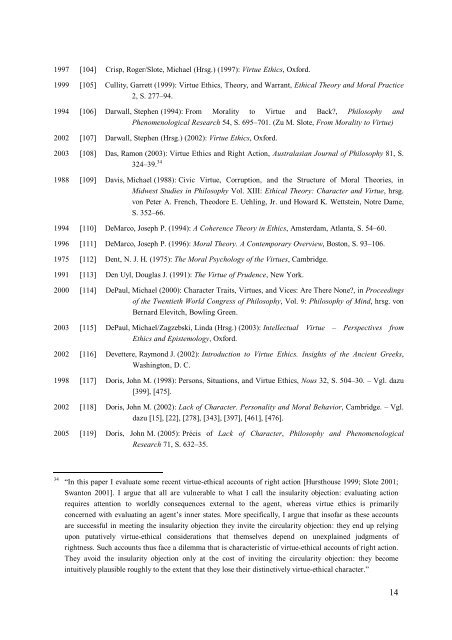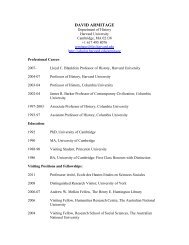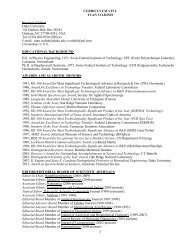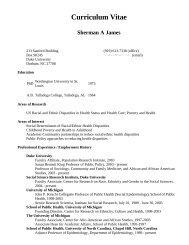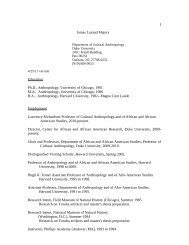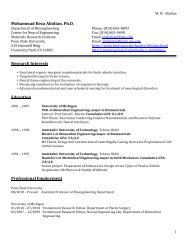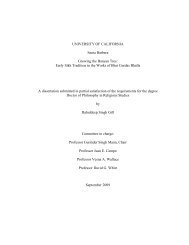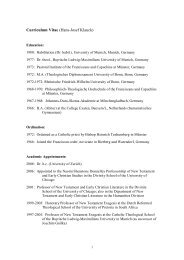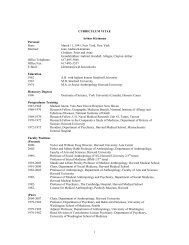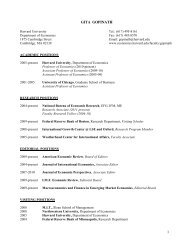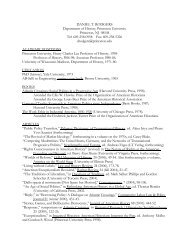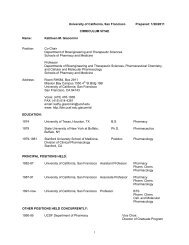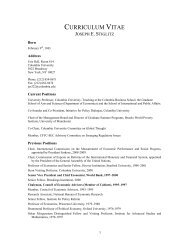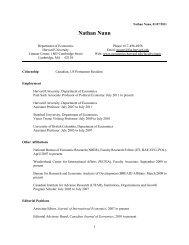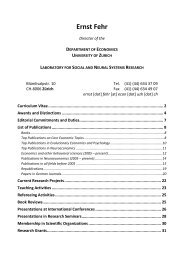1997 [104] Crisp, Roger/Slote, Michael (Hrsg.) (1997): <strong>Virtue</strong> Ethics, Oxford.1999 [105] Cullity, Garrett (1999): <strong>Virtue</strong> Ethics, Theory, and Warrant, Ethical Theory and Moral Practice2, S. 277–94.1994 [106] Darwall, Stephen (1994): From Morality to <strong>Virtue</strong> and Back?, Philosophy andPhenomenological Research 54, S. 695–701. (Zu M. Slote, From Morality to <strong>Virtue</strong>)2002 [107] Darwall, Stephen (Hrsg.) (2002): <strong>Virtue</strong> Ethics, Oxford.2003 [108] Das, Ram<strong>on</strong> (2003): <strong>Virtue</strong> Ethics and Right Acti<strong>on</strong>, Australasian Journal of Philosophy 81, S.324–39. 341988 [109] Davis, Michael (1988): Civic <strong>Virtue</strong>, Corrupti<strong>on</strong>, and the Structure of Moral Theories, inMidwest Studies in Philosophy Vol. XIII: Ethical Theory: Character and <strong>Virtue</strong>, hrsg.v<strong>on</strong> Peter A. French, Theodore E. Uehling, Jr. und Howard K. Wettstein, Notre Dame,S. 352–66.1994 [110] DeMarco, Joseph P. (1994): A Coherence Theory in Ethics, Amsterdam, Atlanta, S. 54–60.1996 [111] DeMarco, Joseph P. (1996): Moral Theory. A C<strong>on</strong>temporary Overview, Bost<strong>on</strong>, S. 93–106.1975 [112] Dent, N. J. H. (1975): The Moral Psychology of the <strong>Virtue</strong>s, Cambridge.1991 [113] Den Uyl, Douglas J. (1991): The <strong>Virtue</strong> of Prudence, New York.2000 [114] DePaul, Michael (2000): Character Traits, <strong>Virtue</strong>s, and Vices: Are There N<strong>on</strong>e?, in Proceedingsof the Twentieth World C<strong>on</strong>gress of Philosophy, Vol. 9: Philosophy of Mind, hrsg. v<strong>on</strong>Bernard Elevitch, Bowling Green.2003 [115] DePaul, Michael/Zagzebski, Linda (Hrsg.) (2003): Intellectual <strong>Virtue</strong> – Perspectives fromEthics and Epistemology, Oxford.2002 [116] Devettere, Raym<strong>on</strong>d J. (2002): Introducti<strong>on</strong> to <strong>Virtue</strong> Ethics. Insights of the Ancient Greeks,Washingt<strong>on</strong>, D. C.1998 [117] Doris, John M. (1998): Pers<strong>on</strong>s, Situati<strong>on</strong>s, and <strong>Virtue</strong> Ethics, Nous 32, S. 504–30. – Vgl. dazu[399], [475].2002 [118] Doris, John M. (2002): Lack of Character. Pers<strong>on</strong>ality and Moral Behavior, Cambridge. – Vgl.dazu [15], [22], [278], [343], [397], [461], [476].2005 [119] Doris, John M. (2005): Précis of Lack of Character, Philosophy and PhenomenologicalResearch 71, S. 632–35.34“In this paper I evaluate some recent virtue-ethical accounts of right acti<strong>on</strong> [Hursthouse 1999; Slote 2001;Swant<strong>on</strong> 2001]. I argue that all are vulnerable to what I call the insularity objecti<strong>on</strong>: evaluating acti<strong>on</strong>requires attenti<strong>on</strong> to worldly c<strong>on</strong>sequences external to the agent, whereas virtue ethics is primarilyc<strong>on</strong>cerned with evaluating an agent’s inner states. More specifically, I argue that insofar as these accountsare successful in meeting the insularity objecti<strong>on</strong> they invite the circularity objecti<strong>on</strong>: they end up relyingup<strong>on</strong> putatively virtue-ethical c<strong>on</strong>siderati<strong>on</strong>s that themselves depend <strong>on</strong> unexplained judgments ofrightness. Such accounts thus face a dilemma that is characteristic of virtue-ethical accounts of right acti<strong>on</strong>.They avoid the insularity objecti<strong>on</strong> <strong>on</strong>ly at the cost of inviting the circularity objecti<strong>on</strong>: they becomeintuitively plausible roughly to the extent that they lose their distinctively virtue-ethical character.”14
2005 [120] Doris, John M. (2005): Replies: Evidence and Sensibility, Philosophy and PhenomenologicalResearch 71, S. 656–77.2010 [121] Doris, John M. (2010): Heated Agreement: Lack of Character as Being for the Good,Philosophical Studies 148, S. 135–46. – Zu [3]. Dazu: [5].2009 [122] Doviak, Daniel (2009): <strong>Virtue</strong>, Satisfacti<strong>on</strong> and Welfare Enhancement, Utilitas 21, S. 59–71. 351989 [123] Driver, Julia (1989): The <strong>Virtue</strong>s of Ignorance, Journal of Philosophy 86, S. 373–84.1994 [124] Driver, Julia (1994): A Critical Study of Michael Slote’s “From Morality to <strong>Virtue</strong>”, Nous 28, S.505–14.1995 [125] Driver, Julia (1995): M<strong>on</strong>keying with Motives: Agent-Basing <strong>Virtue</strong> Ethics, Utilitas 7, S. 281–85.1996 [126] Driver, Julia (1996): The <strong>Virtue</strong>s and Human Nature, in How Should One Live? Essays <strong>on</strong> the<strong>Virtue</strong>s, hrsg. v<strong>on</strong> Roger Crisp, Oxford, S. 111–29.2001 [127] Driver, Julia (2001): Uneasy <strong>Virtue</strong>, Cambridge. – Vgl. dazu: [305], [385].2002 [128] Driver, Julia (2002): Review of On <strong>Virtue</strong> Ethics by Rosalind Hursthouse, Philosophical Review111, S. 122–27. – Zu2004 [129] Driver, Julia (2004): Resp<strong>on</strong>se to my Critics, Utilitas 16, S. 33–41. 36 – Zu [305], [385].2006 [130] Driver, Julia (2006): Ethics. The Fundamentals, Oxford, S. 136–53 (“<strong>Virtue</strong> Ethics”).2006 [131] Driver, Julia (2006): <strong>Virtue</strong> Theory, in C<strong>on</strong>temporary Debates in Moral Theory, hrsg. v<strong>on</strong>James Dreier, Oxford, S. 113–23.1993 [132] Elliot, David (1993): The Nature of <strong>Virtue</strong> and the Questi<strong>on</strong> of Its Primacy, Journal of Value Inquiry27, S. 317–30.2004 [133] Esser, Andrea Marlen (2004): Eine Ethik für Endliche. Kants Tugendlehre in der Gegenwart,Stuttgart-Bad Cannstatt.3536“In ‘Is <strong>Virtue</strong> Its Own Reward?’ Wayne Sumner argues that (1) as a matter of necessity, virtue isintrinsically prudentially rewarding, and (2) if all else is equal, the virtuous will fare better than the n<strong>on</strong>virtuous.In this article, I reproduce and criticize those arguments. I offer several objecti<strong>on</strong>s to the argumentfor the first thesis; each objecti<strong>on</strong> makes the same basic point: c<strong>on</strong>trary to what Sumner assumes, certainc<strong>on</strong>tingent facts over and above a pers<strong>on</strong>’s being virtuous have to obtain if virtue is to issue in anyprudential reward. I object to Sumner’s sec<strong>on</strong>d thesis by arguing that moral neutrality can be at least aswelfare-enhancing as moral virtuosity. Finally, I argue that even if virtue were intrinsically rewarding in theway Sumner envisi<strong>on</strong>s, it would still be impossible to determine a priori whether adopting a virtuouslifestyle would be prudentially rati<strong>on</strong>al.”“This essay is a rejoinder to comments <strong>on</strong> Uneasy <strong>Virtue</strong> made by Onora O'Neill, John Skorupski, andMichael Slote in this issue. In Uneasy <strong>Virtue</strong> I presented criticisms of traditi<strong>on</strong>al virtue theory. I alsopresented an alternative - a c<strong>on</strong>sequentialist account of virtue, <strong>on</strong>e which is a form of ‘pure evaluati<strong>on</strong>alexternalism’. This type of theory holds that the moral quality of character traits is determined by factorsexternal to agency (e.g. c<strong>on</strong>sequences). All three commentators took excepti<strong>on</strong> to this account. Therefore,the bulk of my resp<strong>on</strong>se focuses <strong>on</strong> defending the externalist account of virtue presented in the finalchapters of Uneasy <strong>Virtue</strong>.”15
- Page 1: Literatur
- Page 4 and 5: national Journal of Management Revi
- Page 6: 53.2010 [39] Battaly, Heather (2010
- Page 9 and 10: 2005 [60] Brady, Michael S. (2005):
- Page 11 and 12: 2008 [72] Calhoun, Cheshire (2008):
- Page 13: 1998 [93] Cooper, John M. (1998): T
- Page 17 and 18: 1978 [138] Foot, Philippa (1978): V
- Page 19 and 20: 1996 [166] Griffin, James (1996): V
- Page 21 and 22: 166-84.1996 [188] Hooker, Brad (199
- Page 23 and 24: Theory and Moral Practice 8, S. 387
- Page 25 and 26: Ethics, hrsg. von Patricia H. Werha
- Page 27 and 28: Deutsche Zeitschrift für Philosoph
- Page 29 and 30: 2009 [280] Miller, Christian (2009)
- Page 31 and 32: 2000 [299] Oderberg, David S. (2000
- Page 33 and 34: Moral Education 24, S. 175-184.1997
- Page 35 and 36: Southern Journal of Philosophy 14,
- Page 37 and 38: 1997 [379] Slote, Michael (1997): V
- Page 39 and 40: 2009 [401] Sreenivasan, Gopal (2009
- Page 41 and 42: 2010 [416] Stohr, Karen E. (2010):
- Page 43 and 44: 2008 [441] Tessman, Lisa (2008): Re
- Page 45 and 46: 2009 [457] van Zyl, Liezl (2009): A
- Page 47 and 48: 2006 [475] Webber, Jonathan (2006):
- Page 49 and 50: 2008 [484] White, Richard (2008): R


